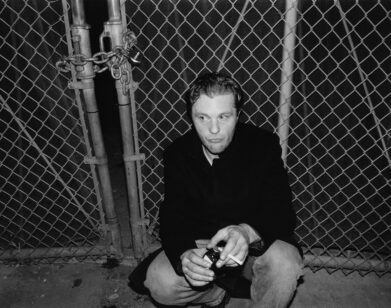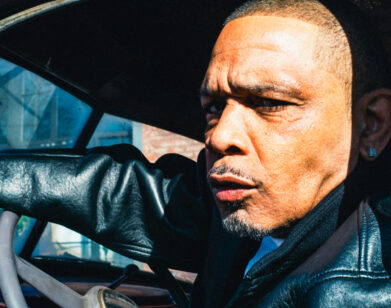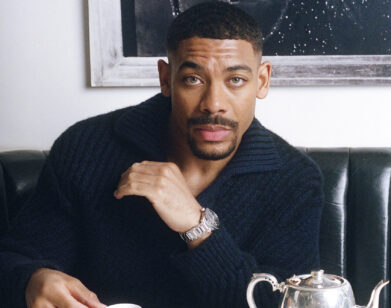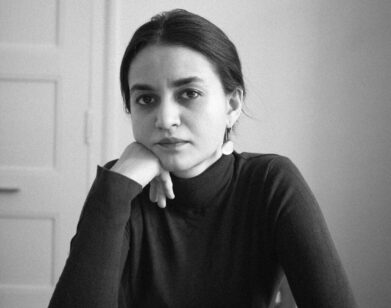New Again: Bruce Dern
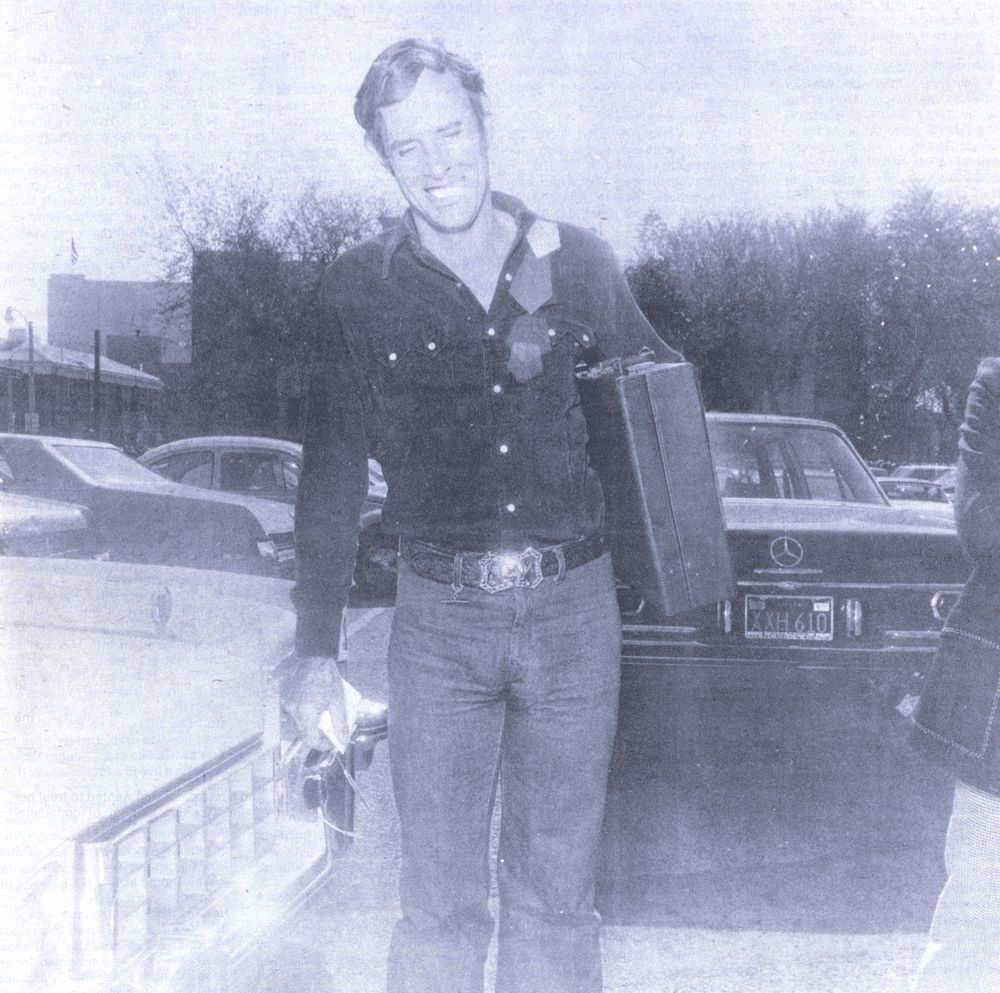
In New Again, we highlight a piece from Interview’s past that resonates with the present.
By the time he turned 43, Bruce Dern had been nominated for an Oscar, starred in 26 films, and married thrice. Since then, the actor—perhaps best known for his dark roles—has accumulated a filmography of over 80 feature films. Next month, you may come to know him as an elderly father chasing a $1 million prize in Alexander Payne’s Nebraska. Following the film’s Cannes debut, we were pleasantly surprised when Dern won Best Actor, which returned his slowing acting career to the forefront. But in his role as Woody Grant, Dern is nothing like the Tom Buchanan (The Great Gatsby, 1974) or Captain Bob Hyde (Coming Home, 1978) we have come to love. To honor the seasoned actor, the AFI Festival in Hollywood recently announced it will host a screening of Nebraska and a tribute for Dern during the 2013 event. Although the film doesn’t premiere in the U.S. until November 15, with such a long career, we decided it best to start refreshing out memories now.—Emily McDermott
Bruce Dern
By Tere Tereba
Bruce Dern was Tom Buchanan in The Great Gatsby, Big Bob Freelander the Santa Rosa car salesman/beauty contest judge of Smile, the orbiting ecologist of Silent Running, the outlaw moralist of Posse. He was Walter Matthau’s partner in The Laughing Policeman; Jack Nicholson’s brother in King of Marvin Gardens; the pregnant girl’s husband in They Shoot Horses, Don’t They?; Bette Davis’ flashback beau in Hush…Hush, Sweet Charlotte. He shot John Wayne in The Cowboys. His surgery concocted the Incredible Two-Headed Transplant after years of literal internship in Hollywood playing “2nd Intern,” “Billy the Clerk” or “Singing Conscientious Objector.” Wild River. Wild Angels. Bloody Mama. Drive, He Said.
Dern is from an impressive Illinois family. His father was Adlai Stevenson’s law partner, his uncle poet Archibald MacLeish, his maternal grandfather the chairman of Carson Pirie Scott, his parternal grandfather, George H. Dern, the governor of Utah and Secretary of War under the FDR administration. He went to Choate, graduated from New Trier High School (other celebrity grads: Ralphy Bellamy, Charlton Heston, Ann-Margaret, Rock Hudson, Hugh O’Brien), went to the University of Pennsylvania, studied at Actor’s Studio in New York, and went to Hollywood lured by a guarantee from TV’s Surfside 6.
He’s just finished three important movies. Alfred Hitchcock’s The Family, which also stars Karen Black; Plot; Won Ton Ton—The Dog Who Saved Hollywood; and Claude Chabrol’s next movie The Twist with Stephan Audran and Ann-Margaret.
Tere Treba talked to Dern on the very ample grounds of the Harold Lloyd estate in Hollywood where Won Ton Ton—The Dog Who Saved Hollywood director Michael Winner was filming a pie-throwing scene. Tere waited for Dern in his dressing room-trailer, thinking about Big Bob Freelander’s mobile home sales-pitch in Smile: “With the Arabs acting up, it’s a pretty secure feeling knowing you’re sitting on top of a hundred gallons of gas!” Dern came in discussing a pro football game with his press agent. He had on his 1920s Won Ton Ton clothes, but for Interview‘s readership offered that he usually wore Polo.
TERE TREBA: I understand you like athletics.
BRUCE DERN: Oh yeah, I’m totally sports-oriented; I relate a lot of my career and everything to sports.
TREBA: What do you mean?
DERN: In all American professional sports you start on a certain level and you have to work your way up through a farm system. It’s really the same in acting. I found a certain solace in that for a long time as an actor; I could identify with guys who were 32 before they got a chance to join the big leagues. Jack [Nicholson] and Redford and I are all 39 and it’s frightening how many people we know who were big leading men in the business when we started who aren’t too visible anymore: Michael Parks, Rip Torn, Tony Franciosa, Bennie Gazzara, Richard Beymer. Richard Beymer has disappeared completely! The others work, but Richard Beymer, he was the star of West Side Story! It’s scary.
TREBA: Well, that’s when you were doing all the Roger Corman things.
DERN: Before them, actually. I didn’t do Corman until mid-’60s, this was early ’60s.
TREBA: What did you do to become an actor?
DERN: I went to a dramatics school in Philadelphia for 18 months, then I went to New York and I made rounds.
TREBA: Did you like New York?
DERN: No. Hated it. I lived there ’58 through ’61 and I drove a cab and saw the really grim side of it.
TREBA: Tell me about it! New York’s no place for an athlete. Woody Allen plays squash at the Yale Club but that’s about it.
DERN: For 11 months I drove a cab for the Loda Garage, 61st and 11th Avenue, for an Irishman named James Feigh, and I used to drive from four in the afternoon until two in the mornings, six nights a week. I made about 140 bucks a week clear which I thought was excelling. There was no union then and you’re into little things in the side, you know…
TREBA: What little things?
DERN: Well, certain clubs give you a dollar for every person you bring there…just for the business. Used to be a place called “The Classic Bar” at 49th and Third and everybody we’d bring there we’d get a dollar for. I never went inside. I don’t know what they did to them inside. “Where should we go, Cabbie?”, “Well, how about ‘The Classic Bar’?” I didn’t give a shit, you know? And then occasionally I’d ride around with the arm up and the light on and that way you can pick up some extra money…I found that I made most of money between four and six because I’d just whip right over to Fifth Avenue at about 56th and everybody was racing for a cab to get the train, you know, and it was 45 or 50 cent rides and they don’t have the time for you to make the change so they’re throwing you a dollar, saying “Oh, oh, oh, keep it!” So, you’d do 10, 12 trips like that and in a little bit of time you’d make about nine dollars for yourself. Then it was always dead after the theatre had opened, around nine o’clock I’d go to have my supper at Bickford’s at 57th and Seventh Avenue.
TREBA: Across from The Osborne?
DERN: Yeah, right, right. Carnegie Hall. I’d park my cab and go in there and I’d have my little dinner and get a sports section. It was a cafeteria, and I’d get my thing and sit down for half an hour. Then I’d meet a friend named Charlie Dierkop, who’s an actor, who drove cab also, who went to dramatics school with me…I’d go home in the day to study acting.
TREBA: What did you do when you came to Hollywood?
DERN: I came to Hollywood to do an episode of Surfside Six. Warner Bros. The Biggie. My agent, named Harvey Orkin, in New York knew Hugh Benson who was the executive producer of it, and he said “Look, I’ve got a guy here who’s a terrific actor, if I fly him to California will you guarantee him one part in your show?” and he said “Yeah…” So I came out and it wasn’t a guarantee. I had to read for the part, and I got it, and did it, and Mike Gruskoff was my agent out here [and] took me around and introduced me to everybody and then I just played little parts. I lived in a motel in Burbank for a week and then I moved to Normandy Village on the Strip. It was one of those places where you could live for a dollar a day, a bunch of ratty little apartments. It was like a whole little town in one block and it was very, very bleak, torn down in 1962. That’s where I first met Jack.
TREBA: He lived here too?
DERN: No, but he had a lot of friends that did.
TREBA: So you came to Hollywood in ’61?
DERN: June 1, ’61…And I did little parts, I played “Lab Technician” and “Billy Clerk” and “Interns” and shit like that. It was hard to get another movie. I had already done a movie for [Elia] Kazan; Wild River was done in Tennessee but the job came out of New York. I had done a play with Kazan too, Sweet Bird of Youth.
TREBA: I read an interview where you said you had thought that Kazan was really going to help you but then Beatty came out of Splendor in the Grass.
DERN: Well not only Warren Beatty but a bunch of other guys too…Gary Lockwood….Sean Garrison…Ben Piazza…Lou Antonio…I couldn’t even get into the prom scene.
TREBA: Not even the prom scene.
DERN: But I just hung around and did little parts here and little parts there, I always made a living as an actor when I came to California. I never had to do anything else. It wasn’t much of a living. I averaging out my income the other day, from 1961 to 1975…
TREBA: Well that must be good for your taxes…
DERN: Well…yeah [laughs]…but the first 12 years in the business I made $144,000 averaging $12,000 a year as an actor…which is, compared to all the other members of S.A.G., that’s pretty good, but compared to the people I’m now competing with, it sucks.
TREBA: It won’t be much longer—you’re on your way to superstardom.
DERN: Since I’ve started to star in pictures I have always managed to retain my singularity of purpose when I got into the business, which was to be an artist, as an actor, more than anything else. But to get the certain kind of role you want, you have to be in a certain position in the business and it’s dog-eat-dog and it gets very hairy and you can lose your point of view sometimes.
TREBA: What do you play in the Hitchcock movie?
DERN: A cab driver, oddly enough, who is an actor who can’t get work and my girlfiend, Barbara Harris, is a fake medium, so I have to get all her information, I’m like the classic Hitchcock leading man in the way that the audience routes for, so that all through the movie they can say “No, don’t go in there! Don’t you know what’s in there?”
TREBA: Right, right…You know, The Great Gatsby…I was expecting you to get nominated for an Academy Award. I was really disappointed I thought you did such a great job.
DERN: Thank you. It might have been one of my better performances but I didn’t expect to get nominated…The Academy Awards are all so lucky and it has to do with the spur of the moment charisma of the picture, how the picture is doing business-wise. It’s very rare that you’ll every get a nomination out of a picture that’s not hot in Hollywood. It would have been nice…I love the Oscars.
TREBA: They’re like trophies…
DERN: I like them for what they are. It’s a big party every year the Academy has. “This year we consider you Top Five America!” That’s it. Fine. I love it.
TREBA: It’s competition again. It’s sports.
DERN: Hey, this is the most competitive business in the world. You can’t deny that come Award time.
TREBA: Oh, Big Bob!
DERN: But when people take it too seriously, when people start really believing it, saying “Oh my God! I won an Oscar! That means I’m really the best actor”…You just can’t do it.
TREBA: What do you like best to do besides acting and sports…
DERN: Well, I’m a big wilderness, mountain guy. I love to go up in the mountains and I can just sit for hours and just look at the mountains.
TREBA: [laughs] Well that’s sports! Let’s hear about your three wives.
DERN: Well, my first wife’s a girl named Marie Piece, who in Philadelphia, where I met her, helped me get through the dramatics school stage of my life. She was terrific, I mean she worked in a bank while I went to dramatics school, you know, and helped support us. Did support us. My second wife I met in Orpheus Descending off-Broadway, which is a Tennessee Williams’ play I did which she was in. Her name’s Diane Ladd, she’s an actress and a very good one and I spent eight years with her and we had two children. One drowned in a swimming pool, and one is alive, Laura, a terrific little girl, I see her a lot, she lives out here in California with her mom and grandmother. The third one is Andrea, who I’ve been married to for six years and she’s the best. I mean she’s the champ, she just went through it all and she gave it all to me and she’s done a terrific job but she’s very much into her own thing. She’s not snowed by show business and yet at the same time she likes to go to parties, she likes to live in a nice hotel when we go on locations and stuff like that…so do I, I mean, I can’t live like crap. [laughs] Whereas Jack, he’d live in a fuckin’ sewer if they put a nice bed there and some papers…but he was brought up in tough circumstances. He’s come a long way but if he can get away with it, or get, I mean he wants his comfort. Now he can get it anytime he wants and he should have it but he’s not that adamant about it.
TREBA: He likes the “common man” image?
DERN: Yeah, well he loves the railroad trainman…His sister’s husband, Shorty George, is a trainman for the Jersey Central Railroad…and Jack kind of identifies with him.
TREBA: So, you like to live well.
DERN: I’m not good at living in the grim places…when we did Gatsby, I lived in Claridges, that’s where I wanted to live. I can’t live in grimness and then go play a classy human being. There were so many years when I went on location when I was less than what I am now, where I had to live in a 6 Motel, and that was the best there was for a guy playing the number 10 part in a movie.
TREBA: When do you think your big break came?…the turning point?
DERN: Well, I don’t think it’s come yet…I don’t know…the beginning I guess was Silent Running, and the award I got for Drive, He Said. Those two things were probably the beginning of the shape of things to come.
TREBA: Do you like foreign directors? Do you like Chabrol? You’ll play with Stéphane Audran?
DERN: Yes.
TREBA: She’s very beautiful.
DERN: She is? I’ve just seen her in picture books. She’ll play my wife.
TREBA: She’s his wife.
DERN: Yeah…It gets a little…you know…I hope I ain’t doin’ a biography here.
TREBA: [laughs] What’s it about?
DERN: The collapse of his marriage. [laughs] No, it’s about the collapse of “a” marriage…but it’s very intricate and very suspenseful for an audience….I love any director who’s on the right project. Michael Winner is excellent here. Hitchcock was excellent in his form, I’m sure Chabrol will be excelling in his…Jack Clayton in Gatsby, I do not feel in that particular picture is a commercial filmmaker…I still think he’s a good filmmaker! I’d work with him again in a certain project, he’s got a lot of original ideas.
TREBA: You were great at Tom Buchanan.
DERN: Well, I had to hang in there. Let’s put it that way. It was not an actor’s picture.
TREBA: Whose picture was it? Coppola’s script?
DERN: No…It was the book. The Great Gatsby. That’s what they wanted to make that’s what they made and it was not a visual experience for an audience. The book never was intended to be and it never was unless you’re going to lift some of that and make it exciting visually you’re not going to pull it off and they didn’t do that and they didn’t pull it off.
TREBA: Yes…Do you like to read?
DERN: I’m not a good reader. I had to take remedial reading in school. I was a slow reader and therefore it’s tough for me to stay interested in things long enough, I’ve read, probably, since college maybe 10 books, which is disgusting. I know people read 10 books a month, but my wife is a terrific reader. I love to read scripts!….If something really fascinates me I’ll read it.
TREBA: What fascinates you?
DERN: Man against the elements, survival, groups of people caught up in things where it takes a tremendous amount of will and togetherness…
TREBA: This is again the outdoor sportsman!
DERN: I’m curious about what makes people do things that they do, unless it’s absolutely terrifying to me. The Manson thing for example, I’m not curious about that because it terrifies me. Anything that has to rationale, to me is terrifying…but the whole S.L.A. thing, that interested me.
TREBA: Interview is a magazine for movie fans, but it’s also a gazette for society fans, so can you talk about your illustrious Illinois family? Your childhood?
DERN: It was a little bleak.
TREBA: Bleak?
DERN: Yeah, because from nine on I was forced to camp every summer. Not a volunteer. I played with the wrong kids so they made me go to camp to straighten me out. I was homesick because I loved my house. I lived in a terrific house on Lake Michigan and I loved the change of weather, but they sent me anyway. Then as soon as I was done and ready to go to high school they sent me to Choate. I hated Choate, because I just hate prep schools. I hated boarding, being away from home. I was homesick. It wasn’t that I had this tremendous affection for my parents, but I just loved my friends and I didn’t want to be sent away to a fuckin’ concentration camp which is what Choate was like to me. I’d never seen 500 more unhappy kids in my life. I was very pissed off at leaving especially because I lived in a town that had a great high school.
TREBA: New Trier? Along with Hollywood High, New Trier High School in Winnetka, Illinois, has the reputation of being the ultimate American High School….
DERN: New Trier. Right, I could have gone to New Trier. You wait all your life to go to New Trier when you come from there. I’m grateful to my parents for everything they gave me in the background and I don’t have to blow up the Bank of America to show them I don’t get on with them, but the big reason why I became an actor in the first place was to communicate. I never acted in high school…I was desperate to communicate. I was a Journalism major and I sucked at that. Really, I was just awful.
TREBA: Where was that?
DERN: University of Pennsylvania.
TREBA: Why did you choose Penn?
DERN: My family… Yeah, they had always gone there… I was a pussy too, though. I didn’t have the guts to go to another place, I should have.
TREBA: So you just did everything they wanted you to do.
DERN: I was afraid, intimidated that I would have had to go out and support myself and I didn’t know what that was like in 1954. Now I can see I should have never gone to college in the first place, I should have gone right into dramatics school, learned how to act instead of waiting around three years while everybody got the jump on me. I wasn’t near as hip or as classy or as neat a person, if that’s what I am now, when I was in high school, therefore when I went to college I was a runner and I was just into that… I was a jock… I was one of the guys from New Trier.
TREBA: You were finally happy at New Trier.
DERN: Oh yeah, it was nice. In my two years there I had a good time. It was rough the first six months. I couldn’t tell all the guys and girls that I grew up with that I went to Choate because my parents forced me to because I was playing with them and they were the wrong kind of kids to grow up with. It was tough. I wasn’t particularly close to my Dad or Mom, my Dad was always traveling around, he was a lawyer, my Mom would go with him a lot. I’d been raised really by a governess, in the house all the time when I was little, and we had a houseman and a maid. The thing I remember about my houseman was that he taught Liberace how to drive a car. They’d both come from Milwaukee. That was bigger to me than anything else, I know Liberace was really neat, you know? [laughs] Any guy who could come from South Milwaukee and make it was a winner to me…
TREBA: Did you go to Choate with Buck Henry? I know he went there.
DERN: We didn’t know each other… He was getting out just when I was there in 8th grade.
TREBA: He doesn’t complain as much about it as you do.
DERN: I think he was a perennial preppy… Buck… The type the parents would have sent to prep school from day one… I didn’t belong in boarding school… Buck did. He was like my roommate in my freshman year. You were told three things, when you go to Choate that you couldn’t do: you couldn’t have a radio, you couldn’t smoke, and you couldn’t jerk off.
TREBA: “Abuse Yourself?”
DERN: [laughs] Right, you couldn’t abuse yourself. Well, my first night in the fuckin’ school I got a roommate [name deleted] from Larchmont, New York, who was listening to the Dodger game on the radio, smoking a cigar, looking at a picture of Eve Meyer in a magazine whacking off… He looked out from under the covers of the bed, and he was a little short kid, and he said, “You open your moth motherfucker and you’re dead.” Now is that heavy for a 13-year-old kid?
TREBA: Did you lead a normal high school life at New Trier?
DERN: Oh yeah, I went steady with a girl. It’s all essential.
TREBA: How long have you been married?
DERN: Six years now. I’ve been married three times and she’s really done the best job far and away for me because she hung in. When we got married I was doing The Incredible Two-Headed Transplant, which was a real dog shit movie. I was just coming out of Roger Corman. I had one more thing to do for him, Bloody Mama. This was just before that and it was terrible. It was a total whore-out by me just to take the money. I only made $1,750 but that was a lot of money to me. I had to get it.
TREBA: That’s all you got for the whole movie?
DERN: In those days. Oh, I wasn’t the lead: I was like a number six in the movie. Bloody Mama I made $5000.
TREBA: Well, I think that you, along with Jack… that you’re both going to be the biggest things!
DERN: Well Jack makes over a million dollars a picture. But it wasn’t too long ago, I mean, he made $650 a week for Easy Rider. What does that come to? He worked for three weeks. He made $1950 for the picture… you know what I mean? Everyone thinks Oh, you make a million if you star in a movie… But after a certain amount of time you start making money. Now I’m starting to make some good money. But it’s taken 19 years. Everybody can’t be like Redford and pop out there and make big bucks right away because you look like a Greek god… The guy’s a friend of mine and he has absolutely no privacy in his life… They don’t leave me alone anymore… They used to… I don’t mind the fans, I like it. It’s tough when you’re in a restaurant… and when I go to play 21. I live in Lake Tahoe as well as Malibu and when I go play blackjack they’re all over.
TREBA: You like to gamble?
DERN: I like to play blackjack. I play for 30 minutes. I take my stopwatch and I leave after a half hour, ahead, behind, or whatever. I just play 21 and I love to bet pro football games.
TREBA: Do you want to direct?
DERN: No. Only in the theatre. There’s no time in life to do all the roles I’d like to play.
TREBA: What kind of roles do you want to play?
DERN: Multi-dimensional human beings. That’s what I’m interested in. If the film isn’t in some way going to study behavior then I’m not interested, but the reason why I’m not interested in directing in film is that it would take me, to be as good an artist as I feel I am an actor, it would take me another 35 just to conquer… Film is a very tough medium, people say, “Hey, just get yourself a good cameraman, you’re a fantastic director,” because I used to teach acting, well, then I would not really be a directing a picture because half of it is knowing what lens sees what at what time of day and how you set it up and how you crop this and where you do that and understanding the editing and all that, and that’s a long process. If I were to get into that it could take me another 20 years to get that down and then I’d have to climb that grim fuckin’ ladder of doing the little TV show, or a commercial, and then a little B movie and… fuck that! I’ve got much more to say as an actor… but in the theatre I would love to direct. I understand that I can make it an event for the audience there that particular evening in the theatre because I have terrific ideas for plays and always have had, I’ve just never had a chance to put them to work because I’ve only directed once in my life. I directed The Goddess out here at The Century City Playhouse. It was a film, it was never a play, but we made it a play. It was very, very interesting… I’d love to do a movie again for Jack… have Jack direct me… He really helped me in Drive, He Said. He never got the credit he deserved for Drive. Everybody else makes a first picture and they always say, “Gee, what a terrific first picture.” They didn’t give that to Jack! It was an outstanding picture!
TREBA: Who else would you like to direct you?
DERN: I would love to have Woody Allen direct me. He’s really terrific and I would really like to do that kind of crazy comedy, but he always stars in his own pictures. “Woody, stop hoggin’ it all.”
THIS INTERVIEW ORIGINALLY RAN IN THE JANUARY 1976 ISSUE OF INTERVIEW.
New Again runs every Wednesday. For more, click here.

